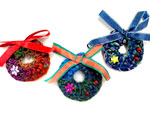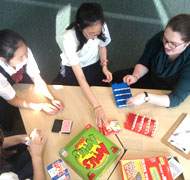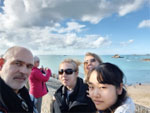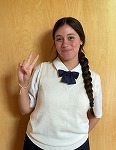Language Center Blog 過去の記事一覧

Sachiko sensei’s present / 幸子先生からの贈り物
 Every year teachers at our school wear a small Christmas badge. There are two types. One is a knitted wreath with some Christmas charms on it and a ribbon, the other is an acorn with some colored ribbon. We wear them on our lanyard or put them on our Bible bags. These are hand-made by Sachiko sensei. This year I chose one that has yellow and blue ribbon because it reminded me of Ukraine and the hardships that the people there will be going through while we are safe indoors celebrating the end of year with our families.
Every year teachers at our school wear a small Christmas badge. There are two types. One is a knitted wreath with some Christmas charms on it and a ribbon, the other is an acorn with some colored ribbon. We wear them on our lanyard or put them on our Bible bags. These are hand-made by Sachiko sensei. This year I chose one that has yellow and blue ribbon because it reminded me of Ukraine and the hardships that the people there will be going through while we are safe indoors celebrating the end of year with our families.
I was surprised a few weeks ago when I looked at my instagram stories. An acquaintance who lives in Tsukuba shared a picture of one of Sachiko sensei’s Christmas badges. It was only then that I realized that Sachiko sensei makes these badges for her Quaker meeting members too. That means she must make more than 200 of these badges every year.
Sachiko sensei has been a teacher here for many decades and is a graduate of the school. She teaches Quakerism and religion. I think she is a very special person and we are lucky that she works here with us because she is well-travelled, she helps us remember the Quaker values that we teach our students, and she models how to live a life in which you show generosity and compassion towards others.
I have kept the badge that I choose every year, so after I add this year’s one I will have 11 of them. I hope to make a Christmas garland with them all some day.
数週間前私はインスタグラムのストーリーズを見て驚きました。筑波に住む知り合いが幸子先生の作ったクリスマスのバッジの写真を投稿していたのです。私はそのとき初めて幸子先生がクエーカーの集まりのメンバーにもバッジを作っていることに気づきました。ということは、幸子先生は毎年200個以上もこれらのバッジを作っているに違いないのです。
幸子先生は普連土学園に何十年も先生として勤めていらっしゃっていて、この学校の卒業生でもあります。先生はクエーカー主義と宗教をお教えになっています。私は先生は特別な方で、私たちと一緒に普連土学園で働いてくださっていることは幸運なことだと思っています。先生は旅行経験が豊富で、私たちが生徒たちに教えるクエーカーの価値観を忘れないようにしてくださり、他人に対して寛大さや思いやりを示す生き方のお手本にもなってくださっているからです。
私は毎年選んでいるバッジを保管していて、今年のバッジを足すと11個になります。いつかバッジを全て使ってクリスマスのガーランドを作りたいと思っています。 Translated by Y.Y 高2
Global Voices 国際交流
普連土学園では、海外との交流は決して特別なことではありません。今までも、今も、そしてこれからもますます、普連土学園の生徒は色々な国で学び、様々な国の生徒が普連土学園を訪れることでしょう。また海外に普連土学園を支えてくれる学校や、フレンド派の施設が数々存在し、その先生たちとの交流も私たちの教育に大切な役割をはたしています。さらに多くの卒業生が、普連土学園で学んだことを土台とし、海外で活躍しています。このような人たちからの便りは、私たちにとってなにより励みとなるものです。皆様にもその声をご紹介したいと思います。

世界に羽ばたく
フランスに留学しています高2
奥山 結麻
 フランスに留学して4ヶ月が経ちました。
フランスに留学して4ヶ月が経ちました。
今私が住んでいる街、シャティヨンはパリから40分ほどの場所にあります。都会ではありますが、東京よりごみごみしておらず広い印象です。
ホストファミリーは両親と19才と17才のホストシスター二人(17才のシスターはアメリカに留学中)の4人で、とても親切にしてもらっています。休日には一緒にパリや田舎にある家に出かけたり、19才のホストシスターとは学校後に買い物や映画鑑賞をすることも多いです。
フランスでの生活で驚いたことは数多くありますが、特に会話の多さには驚かされます。学校でも家でも流れるように話の主題が変わる上に早口で議論するので、最初の頃は話を聞くだけでも大変でした。ホストマザーになぜフランス人がこんなにも議論をするのか聞いたところ返ってきた答えが印象的だったのでご紹介します。
「議論することはお互いにとってプラスになるから。例えば、Aという意見を持った人とBという意見を持った人がいる。各々の意見は違うけれど、議論することによって新しいCという案が生まれる。だから議論は面白いし、私はこうやって新しいアイデアを出すのが好きなの。」
フランスではよく理由と一緒に自分の意見を言うことを求められます。それが相手の意見と合わなかろうと関係なく言う必要があるので初めは遠慮していましたが、合わなくても一つの意見として認めてもらえると分かってからは遠慮なく伝えられるようになりました。
他に特筆すべき事といえば、やはり美術館と飲食店の多さです。文化の中心地なだけあり、テレビで見るような有名美術館からあまり知られていない穴場まで美術館賞を楽しむことができます。またフランスの文化は食を大切にしているので、日常的に美味しいものを食べることができます。
留学生活はまだ半分以上残っています。後悔の無いよう楽しみ、充実したものにしていきたいです。

World Friends
シャイマさん(高1)のインタビュー
O’Connor: Please briefly introduce yourself.
Chaima: Hi, my name is Chaima Achefa, but people call me Chaï. I’m from France. When I came to Friends School I was 17 but now I’m 18. I am a student in 高1 A組, but back in France I am in 高3.
O’Connor: What was the biggest culture shock you experienced here in Japan?
Chaima: Every time someone poses this question to me I’m like “I don’t know”, but maybe my biggest culture shock is that people are so kind. Also, in class, when the class starts everyone is quiet. In France when class starts the teacher has to yell at everyone because they keep talking. So, yeah everyone is so kind and serious.
O’Connor: What did you miss the most about home while being in Japan?
Chaima: Diversity. I think, in Japan the country is open but not so open. Like, in Europe it's really open. In France there are people from multiple backgrounds. We can see people from Japan, American people, Arabic people, black people. So in Japan when I see someone who doesn’t look Japanese I’m surprised and think we can be friends!
Also, in France people are very direct. In Japan, they tell you something little by little, it’s different from France. In France we are not being mean when we are direct and sometimes in Japan I have been too direct with people and they have been shocked. It’s not something I really miss but it makes me think carefully.
O’Connor: What’s your favorite Japanese word?
Chaima: Maybe 愛, because I love the meaning and I love the kanji of 愛. Every time I see the kanji I feel happy. I love 愛.
O’Connor: What was your school life experience like here in Japan? Did you have a favorite subject?
Chaima: I think my favorite subject is Food Fashion. I made my own yukata. Every week when I have this class I’m so happy to go there. The teacher is so kind. I love her. She’s so funny and so kind. My Japanese is not good enough to understand her every time and she cannot speak English but somehow I can understand her. Being in a small class and making my own yukata is so great. It’s so much fun. In France we don’t have a class like that.
I also love Oral Communication. I can speak to teachers and students in English. It’s so interesting. I can really understand so I like that class too.
O’Connor: You joined the 高2 trip to Kyoto and Nara, and the 高1 Empowerment Program. How was it?
Chaima: Incredible. They were my two most favorite moments in Japan. I fell in love with Kyoto — really I love Kyoto! I could grow closer to other 高2 students because I didn’t have many opportunities to talk with them before. And so we became really good friends. I became really good friends with my roommate on the trip. My group for the free day in Kyoto was great. Like, we had so much fun! I also became friends with the taxi driver from Kyoto!! So it was such a great trip!! I laughed a lot and I really liked that trip. Also, the school medical staff on that trip was so kind to me. I really like her, too. We had really good moments.
And the 高1 Empowerment Program I became great friends with the university students who joined us. They were so kind and it was such a fun time, and we could speak French. Spending time with them and with the Friends School students was so nice. I really, really, loved that so at the end I cried. I was really going to miss the university students and having that time with my classmates.
O’ Connor: What was the hardest thing for you this year?
Chaima: I think speaking with each other. I don’t have trouble going up to people but when you don’t speak the language it’s hard. Honestly I’m kind of a bad student because I love studying Japanese but if it’s by myself I don’t study, but my Japanese teacher is really great and my Japanese has improved. But it’s hard for me because in France I’m considered a chatterbox — I’m always talking, I speak too much so for me it was hard when I couldn’t find my words. I was frustrated. But I have good friends here and everyone is so kind so I was happy. But, yeah, it was the most difficult for me.
O’Connor: What’s the next step for you?
Chaima: Right now I want to pass my baccalaureate. I want to go to university, and, I hope I don’t change my mind — I often change my mind, I want to be an English teacher, so maybe at university I’ll study English. I really want to do the science of education to learn about kids and things. It’s really interesting for me. I want to teach junior high school and high school students.
O’Connor: Do you have a message for FGS students?
Chaima: I was really happy to meet everyone because everyone was so kind. I don’t know if it’s special to Friends School but everyone was so kind and welcoming. I want to say thanks because I was really nervous about coming to Japan and not speaking Japanese. I felt bad at first and I was homesick but when I came to school I was so happy. From the first day I was never alone. Hitomi really took me under her wing so I was never, ever alone. Every one came to speak to me on the first day, even within the first hour. I will never forget people like that. Maybe they will forget about me because there will be many exchange students who come but I will never forget them. It’s the best memory in my life. It was such a great experience for me. And thank you too — the teachers are some of the most kind people I have met. So, thank you, just thank you!!


